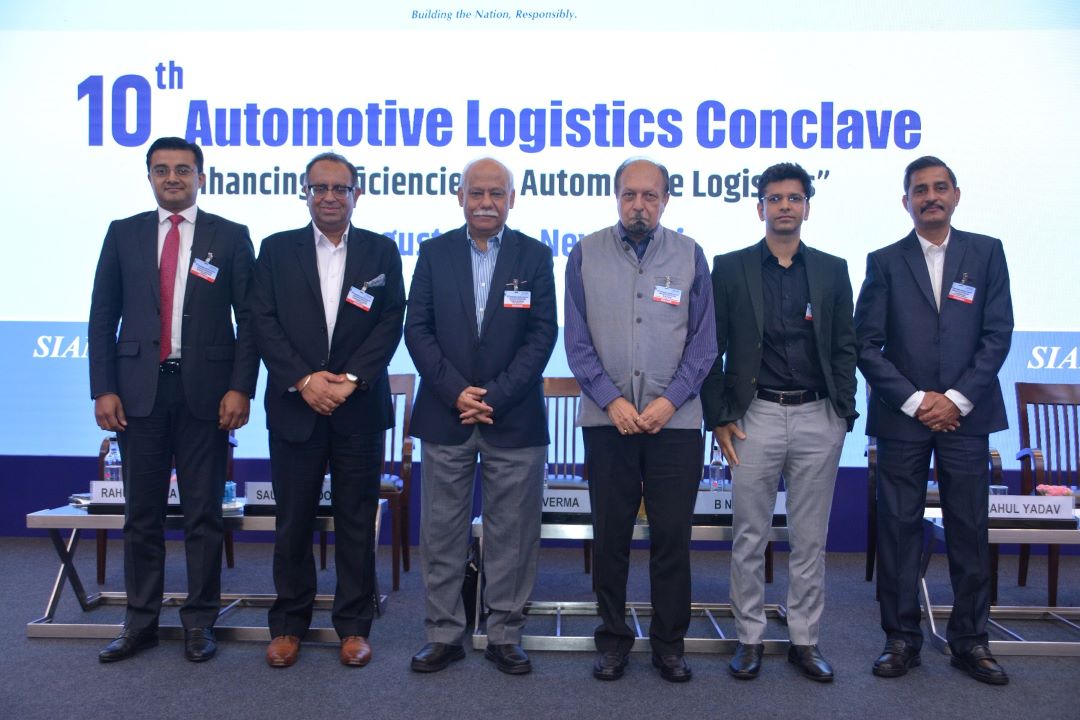The Society of Indian Automobile Manufacturers (SIAM) held its 10th Automotive Logistics Conclave today, bringing together key figures from the automotive and logistics sectors. The event, which took place at the SIAM headquarters, focused on the theme “Enhancing Efficiencies in Automotive Logistics” and aimed to address the latest advancements and strategies shaping the future of automotive logistics in India.
The opening session, titled “Future of Automotive Logistics: Innovations Driving Logistics Efficiency,” was led by Mr Rahul Mishra, Partner at Kearney. The panel featured industry experts including Mr B N Puri, Director at the Asian Institute of Transport Development (AITD), Mr Saurabh Sood, President & Managing Director of GATX India Private Limited (GIPL), Mr Rahul Yadav, CEO of Axestrack, Mr S Kannan, Head of Outbound Logistics at TVS Motors, and Mr Prem Verma, Director at PVA Services. The discussion centered on innovations enhancing efficiency in automotive logistics.
Mr Tapan Ghosh, Chairman of the SIAM Logistics Group and Vice President of Sales at Hyundai Motor India, emphasized the sector’s importance, noting, “The automotive industry’s turnover exceeds Rs 20 lakh crores and contributes about 6.8% to India’s GDP. As the industry evolves with new powertrains, automotive logistics must also adapt to be more efficient, resilient, and sustainable.”
The first session, “Smart Logistics Solutions,” was moderated by Mr. Girish Mirchandani, Editor of Transtopics. Mr. Subhash Chandra Karol, Director at the Department for Promotion of Industry and Internal Trade (DPIIT), spoke about the government’s commitment to reducing logistics costs. “Smart logistics are crucial for efficiency. Our goal is to lower logistics costs from 10% to 7-8% of manufacturing costs, supported by initiatives like PM Gati Shakti and the National Logistics Policy,” he said.
Mr K C Sharma, Chief Engineer at the Ministry of Road Transport & Highways, discussed improvements in accident response and logistics, highlighting a project connecting accident data with medical facilities in Chandigarh and Assam. “We are advancing GNSS-based tolling to improve travel efficiency and reduce stoppages,” he added.
The session also featured contributions from Mr Anil Chhikara, Advisor Transport at the Assam Transport Department; Mr Vipul Nanda, Chairman & Managing Director of Pallia Trans Logistics; Mr Herman Sips, Senior Strategic Advisor at Smart Freight Center; and Mr Yash Pal Sachar, Vice President of Corporate Affairs at Ashok Leyland Limited.
The second session, “Reducing Carbon Footprints by Enhancing Logistics Efficiency,” focused on strategies to minimize the environmental impact of logistics operations. Mr. Alok Tripathi, Executive Director at the Railway Board, discussed the increasing role of railways in automotive logistics. “We are expanding our fleet of specially designed wagons and aim to increase the rail coefficient in automotive logistics from 1.5% to 22%,” he noted.
Panelists for this session included Mr Ashish Bhatt, MD of APLL VASCOR Automotive Pvt Ltd; Mr Mukesh Haritash, Director of Chetak Group; Mr Rajeev Bhaskar, COO (Rail Business) at IVC Logistics; and Mr Pawan Agrawal, Executive Vice President at Maruti Suzuki India Ltd. The session was moderated by Mr Ajeet Kumar, Director of Marketing & Communication at Cargo Connect.
The conclave also featured remarks from industry veterans such as Mr Arun Malhotra, Auto Industry Expert & Former MD of Nissan India, and MrS D Chhabra, Executive Officer (Parts, Accessories & Logistics) at Maruti Suzuki India Ltd. Over 30 logistics companies were recognized for their contributions to the industry.
The 10th SIAM Automotive Logistics Conclave provided a valuable platform for discussing the future of automotive logistics in India, fostering collaboration to address challenges and seize opportunities in the sector.
The Society of Indian Automobile Manufacturers (SIAM) is a non-profit organization representing major vehicle and engine manufacturers in India. SIAM is dedicated to supporting the sustainable development of the Indian automotive industry, enhancing its competitiveness, reducing vehicle costs, increasing productivity, and achieving global quality standards.







